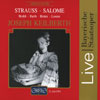R. Strauss Salome
View record and artist detailsRecord and Artist Details
Composer or Director: Richard Strauss
Genre:
Opera
Label: Orfeo d'or
Magazine Review Date: 9/1994
Media Format: CD or Download
Media Runtime: 99
Mastering:
Mono
ADD
Catalogue Number: C342932I

Tracks:
| Composition | Artist Credit |
|---|---|
| Salome |
Richard Strauss, Composer
Adolf Keil, First Soldier, Bass Albrecht Peter, Second Nazarene, Tenor Bavarian State Orchestra Fritz Friedrich, Second Soldier, Bass Gertrud Ebeling, Slave Hans Hotter, Jokanaan, Baritone Inge Borkh, Salome, Soprano Irmgard Barth, Herodias, Mezzo soprano Joseph Keilberth, Conductor Karl Hoppe, Cappadocian, Bass Katja Sabo, Page, Mezzo soprano Lorenz Fehenberger, Narraboth, Tenor Max Lorenz, Herod, Tenor Max Proebstl, First Nazarene, Bass Richard Strauss, Composer |
Author: Alan Blyth
Strauss wanted Mendelssohn-like textures in his Salome. These Keilberth, one of the last conductors to work with the composer, provides in this live Munich performance of 1951. His may not be the most glamorous or most sensual of readings, but it is admirable in making the score sound diaphanous by not over-weighting it with heavy emphases in the modern manner, although it has to be said that the recording sometimes obscures the conductor's efforts.
Likewise the singers are inevitably heard in differing perspectives. Hotter's Jokanaan suffers from being placed too deep in the bowels of the theatre when he's incarcerated in his cistern. For many the attraction of this set will rightly be his assumption of the prophet, one of his most famous roles in the early part of his long career, not 'officially' available on disc elsewhere. It appears that at the beginning he is being troubled by hay fever, just as he was a month earlier in the same summer in Die Meistersinger at Covent Garden. Hence his singing is effortful and unsteady, but gradually he conquers his difficulties and in his prophecies pours forth a stream of rich tone in suggesting Jokanaan's visionary state of mind. Even when he is still out of voice his Lieder-singer's treatment of such a phrase as ''Und suche des Menschen Sohn'' (fig. 89 in the full score) is illuminating in a very special way.
Similarly, Borkh takes time to find her best form. She begins by sounding a shade shrewish rather than girl-like, but eventually her tone attains its true lustre and she brings the considerable best out of herself, ending with a rapturously sensual final scene. Her Salome is neither the equal of her Elektra nor on a par with Welitsch's contemporaneous reading, or that of Wegner on the recently reissued Philips set (5/94) of a similar vintage. However, heard live it carries an often vital sense of occasion, conveying all Salome's wilful obstinacy. Lorenz as Herod suggests the crazed king's neurotic nature, but his singing is frequently inaccurate and towards the end he misses an entry entirely. The Herodias is definitely past her best. Fehenberger's Narraboth is lyrical and sensitive but underpowered.
I can recommend this account only as an adjunct to either the Studer (DG, 9/91) or Nilsson (Decca, 7/85) versions, and then mainly for Hotter's and Borkh's contributions. The sound, apart from the drawbacks of changing perspectives, is adequate.'
Likewise the singers are inevitably heard in differing perspectives. Hotter's Jokanaan suffers from being placed too deep in the bowels of the theatre when he's incarcerated in his cistern. For many the attraction of this set will rightly be his assumption of the prophet, one of his most famous roles in the early part of his long career, not 'officially' available on disc elsewhere. It appears that at the beginning he is being troubled by hay fever, just as he was a month earlier in the same summer in Die Meistersinger at Covent Garden. Hence his singing is effortful and unsteady, but gradually he conquers his difficulties and in his prophecies pours forth a stream of rich tone in suggesting Jokanaan's visionary state of mind. Even when he is still out of voice his Lieder-singer's treatment of such a phrase as ''Und suche des Menschen Sohn'' (fig. 89 in the full score) is illuminating in a very special way.
Similarly, Borkh takes time to find her best form. She begins by sounding a shade shrewish rather than girl-like, but eventually her tone attains its true lustre and she brings the considerable best out of herself, ending with a rapturously sensual final scene. Her Salome is neither the equal of her Elektra nor on a par with Welitsch's contemporaneous reading, or that of Wegner on the recently reissued Philips set (5/94) of a similar vintage. However, heard live it carries an often vital sense of occasion, conveying all Salome's wilful obstinacy. Lorenz as Herod suggests the crazed king's neurotic nature, but his singing is frequently inaccurate and towards the end he misses an entry entirely. The Herodias is definitely past her best. Fehenberger's Narraboth is lyrical and sensitive but underpowered.
I can recommend this account only as an adjunct to either the Studer (DG, 9/91) or Nilsson (Decca, 7/85) versions, and then mainly for Hotter's and Borkh's contributions. The sound, apart from the drawbacks of changing perspectives, is adequate.'
Discover the world's largest classical music catalogue with Presto Music.

Gramophone Digital Club
- Digital Edition
- Digital Archive
- Reviews Database
- Full website access
From £8.75 / month
Subscribe
Gramophone Full Club
- Print Edition
- Digital Edition
- Digital Archive
- Reviews Database
- Full website access
From £11.00 / month
Subscribe
If you are a library, university or other organisation that would be interested in an institutional subscription to Gramophone please click here for further information.




